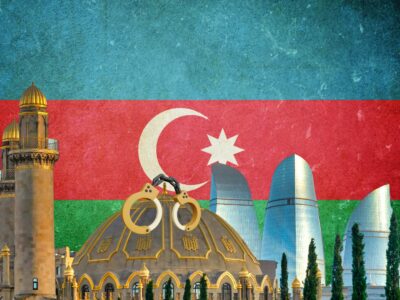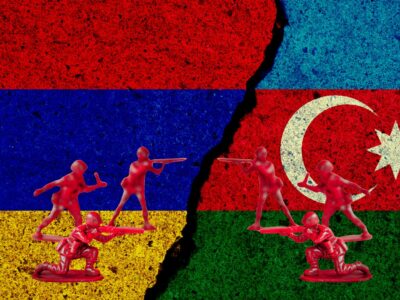
Photo provided by Cllare Chevry and used with permission.
Europe’s linguistic diversity is increasingly reflected in online spaces, where regional and minority language speakers and their communities leverage digital tools and media to preserve, promote, and revitalize their language heritage. In this spirit, Rising Voices’ online campaign @EuroDigitalLang has been curating a rotating X (formerly Twitter) account. Here, language activists and advocates narrate their personal stories in their own words, engaging directly with their audience and sharing ongoing challenges as well as successes.
In this email interview, Rising Voices spoke to upcoming host Cllare Adelheid Chevry of Quairìlhaons, a new local association working towards revitalizing the Romance Lothringian language in Nancei, Lothringia. More info can be found at their X account: @quairilhaons. Cllare will be managing the account the week of April 15–21, 2024.
Rising Voices (RV): Please tell us about yourself and your language-related work.
Cllare Chevry (CC): I come from a relatively multilingual family background. One of my grandmothers comes from German Lothringia and speaks Lothringerdeitsch and Standard German natively. One of my grandfathers speaks a bit of Poitevin, yet I was never taught any of my family's languages; I was never taught Romance Lothringian either, I was only taught French. So when I was 14, I decided to fix that.
I taught myself Lothringian using old books and stuff I could find online, with the help of André Touchet, another speaker of the language, who I kind of see as a mentor and is now part of our association as well! I started rebuilding a connection with the language, something so much more meaningful than anything I could've built with French, because ultimately, French is not truly my language. The language of my heart is Lothringian, it's a part of who I am.
I spent the last few years trying to give the language an online presence, using my social media accounts, and working on the creation of a supradialectal orthography, meant to enable people to write in their dialect and be read in another.
And recently, one of my dreams finally came true, I found other young people who were interested in the language and wanted to reconnect with it like I did as a teen, and I founded Quairìlhaons with them, with the help of Touchet! We're a very new association, but we plan to organize language classes, conferences, outside quaraolhs (which basically means setting up chairs somewhere and chatting in the language together).
We want to go to elder speakers of the language, and build links with them, make them meet the younger folks in the association, document the language together, chat together, learn things together, in order to bridge the gap between generations. We also want to build links with other social movements in the area, as we believe the struggle for the rights of our language is closely tied to other social struggles, and we believe in the need for our project to be inclusive and built on solidarity.
We also want to take advantage of tools such as social media in order to reach younger audiences, which is crucial for a revitalisation project.
RV: What is the current state of your language both online and offline?
CC: I don't like using euphemisms, so I'll be blunt: it is dying.
Online, there are a few old websites from the early 2000s that have content in/about the language (usually just texts and dictionaries), my private social media account, the official Quairìlhaons accounts, two small Facebook pages, and that's it. If you know where to look, you'll also find some old videos.
Offline, it has almost no public presence except in a few individual villages where it is promoted to a slight extent (but generally just for tourism). If you want to find books in Lothringian, you have to go to yard sales and be lucky. If you want to find speakers of Lothringian, you have to contact the few local associations that still exist, or you have to go to rural areas yourself, get people to trust you, and hope they'll be able to point you towards an elder who speaks the language.
Linguistic transmission has been broken almost a century ago, the language is spoken only by a tiny minority of elders. I'm just one of the handful of exceptions. The repression policies that were enacted for around a century did a lot of harm, and have almost fully reached their goal. It's a sad and enraging situation.
With that said, I believe there is still hope, in fact I believe that the next few years might be a turning point.
RV: What are your motivations for seeing your language present in digital spaces?
CC: I want our language's presence to be loud and proud, in open defiance of the current status quo. The internet could have been an amazingly multilingual place, but instead of that, it's become a huge vector of linguistic marginalization. Half of the internet's content is in English. I'd like Quairìlhaons to be able to lay the foundations for an online space that would resist this current, where speakers of the language could express themselves freely without shame and actually be read by others, where use of our language would be normalized, and where we could show the world that we still exist and that we don't intend to go away.
RV: Describe some of the challenges that prevent your language from being fully utilized online.
CC: The obvious challenge is the lack of speakers, of course. If a language has lost the majority of its speakers, it isn't going to have a big online presence. A deeper challenge is rooted in how French society envisions marginalized languages, and how it makes language revitalization projects fail. Over here, you can totally talk and write about Lothringian, it is an honorable thing to document this curiosity, this “patois,” before it is lost, but it is entirely taboo to actually speak the language, to actually show that it is a living language. Documenting the language is charity, speaking the language is backwardness. We need to break this taboo.
France used to enact violent policies of repression against our languages, they've created a huge stigma, and now they don't need these policies anymore, because the stigma and taboo they've created are already slowly finishing the work on their own.
Article 75.1 of the French Constitution is often translated as “regional languages belong to France's heritage,” but the word “patrimoine” has a specific connotation that isn't quite rendered by the word “heritage.” To be clear, this article means nothing; no specific language other than French is actually named in the French Constitution or in any French laws, it isn't completed by any precise laws that actually recognize our languages. But ironically, it does give accurate insight on how French society views our languages — as something that belongs to the past, that should be preserved, but only like an object you put in a museum; they are meant to be a property that should be maintained, they are not meant to be alive.
RV: What concrete steps do you think can be taken to encourage younger people to begin learning their language or keep using their language?
CC: There are many steps we need to take. But basically, it's about doing everything in our power to go to them, break the taboos and give them opportunities. We can use social media as much as possible. Talk to young people where they are, like at schools and universities. We can give classes about the language and building knowledge together. We can organize small outdoor events to chat with one another, encouraging young people to talk with elders. We can build a social movement, based on mutual solidarity free from discrimination. Creating easy-to-use pedagogical resources, such as a supradialectal orthography, that are freely available and easy for learners to find. We can organize a Lothringian language conference to bring together different associations. Writing books, singing songs, creating TV shows, and creating fiction are also possibilities.
A lot of these ideas may sound simplistic, but I believe they're direly needed. You'll probably notice I haven't really mentioned state policies, co-officiality, or institutional stuff in general, which might seem strange, as they are usually the things people first think of when talking about concrete steps.
What we are in control of is what we do ourselves, and I believe we need to trust ourselves more.







